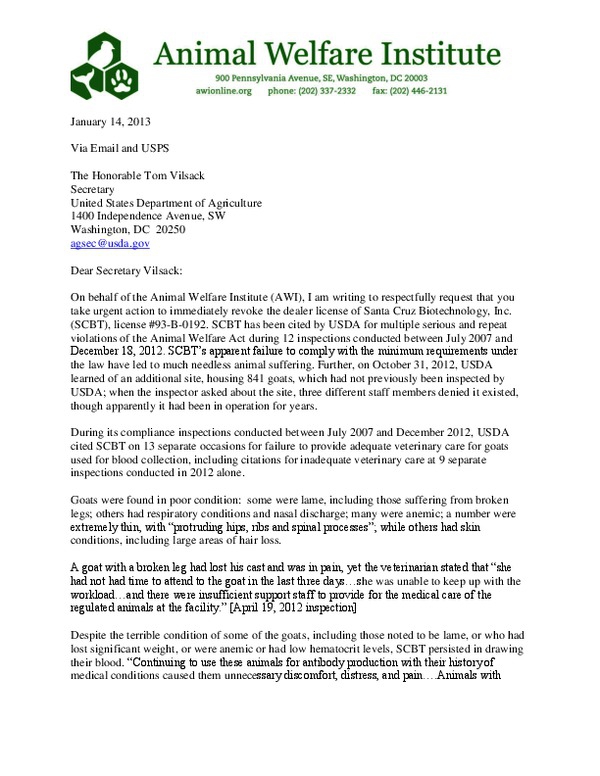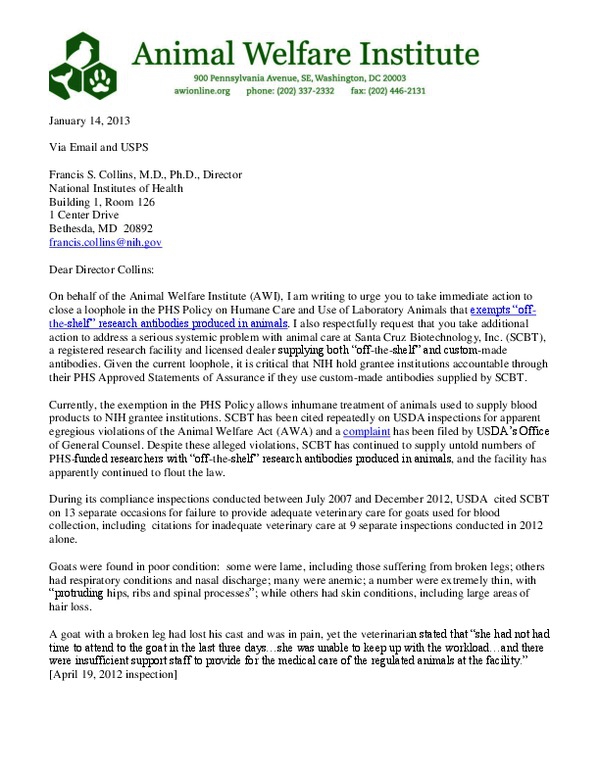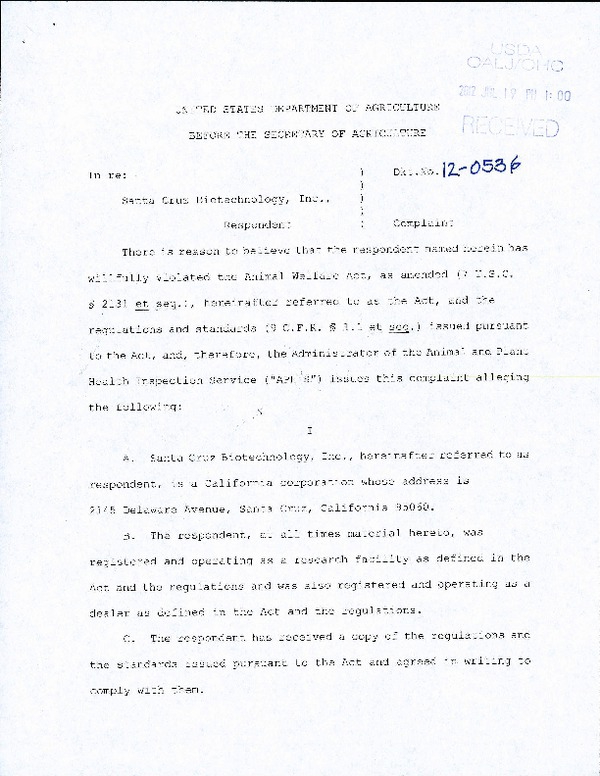From the Open-Publishing Calendar
From the Open-Publishing Newswire
Indybay Feature
Santa Cruz Indymedia
U.S.
Animal Liberation
Government & Elections
Health, Housing & Public Services
Animal Welfare Institute Requests Action from Federal Agencies on Santa Cruz Biotechnology
Take urgent action to immediately revoke the dealer license of Santa Cruz Biotechnology, Inc. (SCBT), license #93-B-0192
Letters to USDA's Secretary, Tom Vilsack & NIH's Director, Francis S. Collins, M.D., Ph.D.
Letters to USDA's Secretary, Tom Vilsack & NIH's Director, Francis S. Collins, M.D., Ph.D.
January 14, 2013
Via Email and USPS
The Honorable Tom Vilsack
Secretary
United States Department of Agriculture
1400 Independence Avenue, SW
Washington, DC 20250
agsec@usda.gov
Dear Secretary Vilsack:
On behalf of the Animal Welfare Institute (AWI), I am writing to respectfully request that you take urgent action to immediately revoke the dealer license of Santa Cruz Biotechnology, Inc. (SCBT), license #93-B-0192. SCBT has been cited by USDA for multiple serious and repeat violations of the Animal Welfare Act during 12 inspections conducted between July 2007 and December 18, 2012. SCBT’s apparent failure to comply with the minimum requirements under the law have led to much needless animal suffering. Further, on October 31, 2012, USDA learned of an additional site, housing 841 goats, which had not previously been inspected by USDA; when the inspector asked about the site, three different staff members denied it existed, though apparently it had been in operation for years.
During its compliance inspections conducted between July 2007 and December 2012, USDA cited SCBT on 13 separate occasions for failure to provide adequate veterinary care for goats used for blood collection, including citations for inadequate veterinary care at 9 separate inspections conducted in 2012 alone.
Goats were found in poor condition: some were lame, including those suffering from broken legs; others had respiratory conditions and nasal discharge; many were anemic; a number were extremely thin, with “protruding hips, ribs and spinal processes”; while others had skin conditions, including large areas of hair loss.
A goat with a broken leg had lost his cast and was in pain, yet the veterinarian stated that “she had not had time to attend to the goat in the last three days...she was unable to keep up with the workload...and there were insufficient support staff to provide for the medical care of the regulated animals at the facility.” [April 19, 2012 inspection]
Despite the terrible condition of some of the goats, including those noted to be lame, or who had lost significant weight, or were anemic or had low hematocrit levels, SCBT persisted in drawing their blood. “Continuing to use these animals for antibody production with their history of medical conditions caused them unnecessary discomfort, distress, and pain....Animals with chronic and significant medical conditions are not suitable subjects for antibody production,” states a May 5, 2010 USDA inspection.
Among the most appalling findings by USDA is in its October 31, 2012 inspection which revealed that SCBT had willfully hidden from USDA the existence of a site housing 841 goats. "Several staff members as well as management at this facility failed to inform APHIS officials of the location of a site where regulated animals were housed and regulated activities (blood collection for antibody production) were taking place. The existence of the site was denied even when directly asked during APHIS inspections. By failing to disclose this information the registrant has interfered with APHIS officials and prevented them from carrying out their responsibility to enforce the Animal Welfare Act." The inspector found that “veterinary staff does not visit this herd,” and reviewed SCBT’s records regarding 12 goats identified by the inspector as having “significant health concerns”; the inspector stated that “none of these animals had received any treatment or veterinary observation.” The inspection also cited the SCBT Institutional Animal Care and Use Committee (IACUC) for permitting unapproved changes in protocols that mandated that body weights and hematocrit levels be measured prior to blood collection in these goats.
Guidelines for antibody production in animals published by the National Academy of Sciences’ Institute for Laboratory Animal Research [1], European Centre for the Validation of Alternative Methods [2], and the Canadian Council on Animal Care [3], among others, state how carefully animals must be monitored and treated to avoid the very problems of suffering and distress that USDA repeatedly documented at SCBT; these guidelines include, for example, how important body weights are in determining the amount of blood to be taken.
USDA’s team of inspectors is to be commended for the excellent job it has done of documenting the situation at SCBT, and multiple times to conduct what must be very tough, time-consuming inspections. AWI appreciates that a complaint has been filed in this case and that an investigation of the facility is open and ongoing. However, given the long-standing nature of the direct, repeat violations of the AWA, the unnecessary suffering that has been caused to animals (that is not identified in the facility’s annual report as required by law), and the deceit exercised by facility staff who repeatedly denied to USDA the very existence of an additional site—all clearly laid out by USDA veterinarians—AWI respectfully requests that USDA seek the immediate revocation of the dealer license held by Santa Cruz Biotechnology, Inc.
Thank you for your prompt consideration, and I look forward to hearing from you.
Sincerely,
Cathy Liss
President, Animal Welfare Institute
cc: Dr. Gregory L. Parham, APHIS Administrator, gregory.l.parham@aphis.usda.gov
1. dels-old.nas.edu/ilar_n/ilarjournal/46_3/pdfs/v4603Leenaars.pdf
2. ecvam.jrc.ec.europa.eu/publication/WorkshopReport35.pdf
3. www.ccac.ca/Documents/Standards/Guidelines/Antibody_production.pdf
Via Email and USPS
The Honorable Tom Vilsack
Secretary
United States Department of Agriculture
1400 Independence Avenue, SW
Washington, DC 20250
agsec@usda.gov
Dear Secretary Vilsack:
On behalf of the Animal Welfare Institute (AWI), I am writing to respectfully request that you take urgent action to immediately revoke the dealer license of Santa Cruz Biotechnology, Inc. (SCBT), license #93-B-0192. SCBT has been cited by USDA for multiple serious and repeat violations of the Animal Welfare Act during 12 inspections conducted between July 2007 and December 18, 2012. SCBT’s apparent failure to comply with the minimum requirements under the law have led to much needless animal suffering. Further, on October 31, 2012, USDA learned of an additional site, housing 841 goats, which had not previously been inspected by USDA; when the inspector asked about the site, three different staff members denied it existed, though apparently it had been in operation for years.
During its compliance inspections conducted between July 2007 and December 2012, USDA cited SCBT on 13 separate occasions for failure to provide adequate veterinary care for goats used for blood collection, including citations for inadequate veterinary care at 9 separate inspections conducted in 2012 alone.
Goats were found in poor condition: some were lame, including those suffering from broken legs; others had respiratory conditions and nasal discharge; many were anemic; a number were extremely thin, with “protruding hips, ribs and spinal processes”; while others had skin conditions, including large areas of hair loss.
A goat with a broken leg had lost his cast and was in pain, yet the veterinarian stated that “she had not had time to attend to the goat in the last three days...she was unable to keep up with the workload...and there were insufficient support staff to provide for the medical care of the regulated animals at the facility.” [April 19, 2012 inspection]
Despite the terrible condition of some of the goats, including those noted to be lame, or who had lost significant weight, or were anemic or had low hematocrit levels, SCBT persisted in drawing their blood. “Continuing to use these animals for antibody production with their history of medical conditions caused them unnecessary discomfort, distress, and pain....Animals with chronic and significant medical conditions are not suitable subjects for antibody production,” states a May 5, 2010 USDA inspection.
Among the most appalling findings by USDA is in its October 31, 2012 inspection which revealed that SCBT had willfully hidden from USDA the existence of a site housing 841 goats. "Several staff members as well as management at this facility failed to inform APHIS officials of the location of a site where regulated animals were housed and regulated activities (blood collection for antibody production) were taking place. The existence of the site was denied even when directly asked during APHIS inspections. By failing to disclose this information the registrant has interfered with APHIS officials and prevented them from carrying out their responsibility to enforce the Animal Welfare Act." The inspector found that “veterinary staff does not visit this herd,” and reviewed SCBT’s records regarding 12 goats identified by the inspector as having “significant health concerns”; the inspector stated that “none of these animals had received any treatment or veterinary observation.” The inspection also cited the SCBT Institutional Animal Care and Use Committee (IACUC) for permitting unapproved changes in protocols that mandated that body weights and hematocrit levels be measured prior to blood collection in these goats.
Guidelines for antibody production in animals published by the National Academy of Sciences’ Institute for Laboratory Animal Research [1], European Centre for the Validation of Alternative Methods [2], and the Canadian Council on Animal Care [3], among others, state how carefully animals must be monitored and treated to avoid the very problems of suffering and distress that USDA repeatedly documented at SCBT; these guidelines include, for example, how important body weights are in determining the amount of blood to be taken.
USDA’s team of inspectors is to be commended for the excellent job it has done of documenting the situation at SCBT, and multiple times to conduct what must be very tough, time-consuming inspections. AWI appreciates that a complaint has been filed in this case and that an investigation of the facility is open and ongoing. However, given the long-standing nature of the direct, repeat violations of the AWA, the unnecessary suffering that has been caused to animals (that is not identified in the facility’s annual report as required by law), and the deceit exercised by facility staff who repeatedly denied to USDA the very existence of an additional site—all clearly laid out by USDA veterinarians—AWI respectfully requests that USDA seek the immediate revocation of the dealer license held by Santa Cruz Biotechnology, Inc.
Thank you for your prompt consideration, and I look forward to hearing from you.
Sincerely,
Cathy Liss
President, Animal Welfare Institute
cc: Dr. Gregory L. Parham, APHIS Administrator, gregory.l.parham@aphis.usda.gov
1. dels-old.nas.edu/ilar_n/ilarjournal/46_3/pdfs/v4603Leenaars.pdf
2. ecvam.jrc.ec.europa.eu/publication/WorkshopReport35.pdf
3. www.ccac.ca/Documents/Standards/Guidelines/Antibody_production.pdf
For more information:
http://awionline.org/SCBT
Add Your Comments
Latest Comments
Listed below are the latest comments about this post.
These comments are submitted anonymously by website visitors.
TITLE
AUTHOR
DATE
Our community should not allow this
Mon, Jan 21, 2013 9:39PM
ALF needed now
Sat, Jan 19, 2013 10:25AM
We are 100% volunteer and depend on your participation to sustain our efforts!
Get Involved
If you'd like to help with maintaining or developing the website, contact us.
Publish
Publish your stories and upcoming events on Indybay.
Topics
More
Search Indybay's Archives
Advanced Search
►
▼
IMC Network





